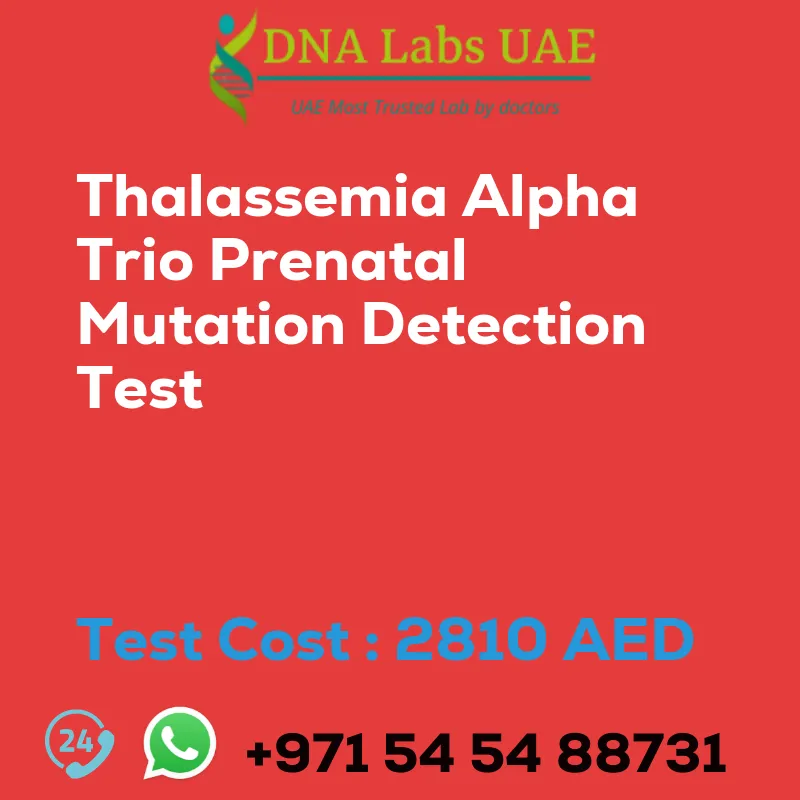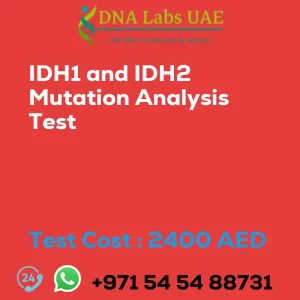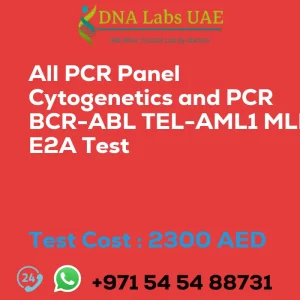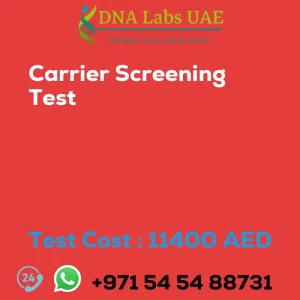THALASSEMIA ALPHA TRIO PRENATAL MUTATION DETECTION Test
Cost: AED 2810.0
Overview
The Thalassemia Alpha Trio Prenatal Mutation Detection Test is a genetic test used to detect mutations in the alpha-globin gene, which is associated with thalassemia, a genetic blood disorder. This test is performed during pregnancy to determine if the fetus has inherited the mutation from the parents.
Test Components and Price
- Sample Condition: 4 mL (2 mL min.) whole blood in 1 Lavender top (EDTA) tube from both parents AND 10 mL (5 mL min.) Amniotic fluid in a sterile screw capped container. Ship refrigerated. DO NOT FREEZE.
- Report Delivery: Sample Mon by 9 am; Report Fri
- Method: PCR, MLPA
- Test type: Genetic Disorders
- Doctor: Hematologist
- Test Department: MOLECULAR DIAGNOSTICS
Pre Test Information
Duly filled Prenatal Genetic testing consent form (Form 18) & Genomics Clinical information requisition form (Form 20) is mandatory.
Test Details
The Thalassemia Alpha Trio Prenatal Mutation Detection Test analyzes the DNA of the parents and the fetus to identify any mutations in the alpha-globin gene. It can detect various types of mutations, including deletions, insertions, and point mutations. If a mutation is detected in the fetus, it indicates that the child may have thalassemia or be a carrier of the disease.
Thalassemia is caused by a deficiency in the production of hemoglobin, the protein responsible for carrying oxygen in the blood. The alpha-globin gene is involved in the production of alpha-globin chains, which combine with beta-globin chains to form hemoglobin.
It is important to note that this test specifically targets mutations in the alpha-globin gene and does not detect mutations in other genes associated with thalassemia, such as the beta-globin gene. Therefore, additional tests may be required to fully assess the risk of thalassemia in the fetus.
The Thalassemia Alpha Trio Prenatal Mutation Detection Test is typically performed in specialized genetic laboratories and requires a sample of amniotic fluid or chorionic villus sampling (CVS) tissue. The samples are collected during the second trimester of pregnancy.
It is recommended that individuals considering this test consult with a genetic counselor or healthcare provider to fully understand the implications and limitations of the test.
| Test Name | THALASSEMIA ALPHA TRIO PRENATAL MUTATION DETECTION Test |
|---|---|
| Components | |
| Price | 2810.0 AED |
| Sample Condition | 4 mL (2 mL min.) whole blood in 1 Lavender top (EDTA) tube from both parents AND 10 mL (5 mL min.) Amniotic fluid in a sterile screw capped container. Ship refrigerated. DO NOT FREEZE. Duly filled Prenatal Genetic testing consent form (Form 18) & Genomics Clinical information requisition form (Form 20) is mandatory. |
| Report Delivery | Sample Mon by 9 am; Report Fri |
| Method | PCR, MLPA |
| Test type | Genetic Disorders |
| Doctor | Hematologist |
| Test Department: | MOLECULAR DIAGNOSTICS |
| Pre Test Information | Duly filled Prenatal Genetic testing consent form (Form 18) & Genomics Clinical information requisition form (Form 20) is mandatory. |
| Test Details |
The Thalassemia Alpha Trio Prenatal Mutation Detection Test is a genetic test used to detect mutations in the alpha-globin gene, which is associated with thalassemia, a genetic blood disorder. This test is performed during pregnancy to determine if the fetus has inherited the mutation from the parents. Thalassemia is caused by a deficiency in the production of hemoglobin, the protein responsible for carrying oxygen in the blood. The alpha-globin gene is involved in the production of alpha-globin chains, which combine with beta-globin chains to form hemoglobin. The Thalassemia Alpha Trio Prenatal Mutation Detection Test analyzes the DNA of the parents and the fetus to identify any mutations in the alpha-globin gene. It can detect various types of mutations, including deletions, insertions, and point mutations. If a mutation is detected in the fetus, it indicates that the child may have thalassemia or be a carrier of the disease. The test can help parents make informed decisions about their pregnancy and plan for appropriate medical care if needed. It is important to note that this test specifically targets mutations in the alpha-globin gene and does not detect mutations in other genes associated with thalassemia, such as the beta-globin gene. Therefore, additional tests may be required to fully assess the risk of thalassemia in the fetus. The Thalassemia Alpha Trio Prenatal Mutation Detection Test is typically performed in specialized genetic laboratories and requires a sample of amniotic fluid or chorionic villus sampling (CVS) tissue. The samples are collected during the second trimester of pregnancy. It is recommended that individuals considering this test consult with a genetic counselor or healthcare provider to fully understand the implications and limitations of the test. |








